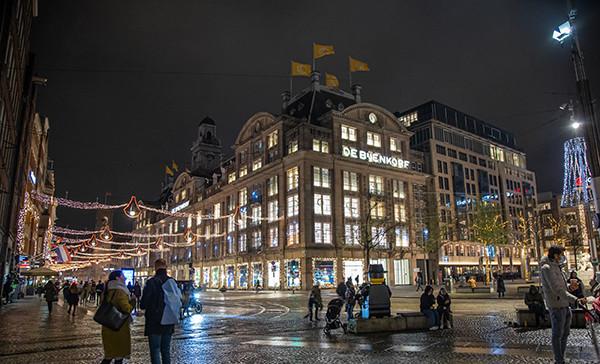As the new coronavirus variant, Aomi Kerong, wreaks havoc around the world, the Christmas and New Year holidays are just around the corner, and large-scale celebrations of all kinds are likely to lead to further exacerbation of the epidemic. According to the surging news (www.thepaper.cn), in order to cope with the risk of epidemic during the holiday season, some countries have adopted preventive lockdowns and restriction measures to prevent the outbreak of the epidemic.

On December 19, 2021, local time, the streets of Amsterdam, the Netherlands, were sparsely populated. People's Vision Diagram
Europe and the United States have successively adopted restrictive and blockade measures
According to Reuters, Dutch Prime Minister Mark Rutte announced on December 18 that a strict nationwide lockdown would be imposed from 19 to control the sharp increase in the number of infected people; the Irish government ordered that all restaurants and bars except delivery services must be closed after 8 pm.
According to the Straits Times reported on December 22, the Swedish government restricts the maximum number of people to private gatherings to no more than 50 people, while advising people to work from home. Swedish Prime Minister Magdalena Andersson confessed: "I understand that many people are tired of it – and so am I – but we are now facing a new virus, which means we are in a new situation." ”
The Portuguese government said on Dec. 21 that the country was reintroducing a series of lockdown measures, including closing all nightclubs, having to show negative nucleic acid test results in places such as theatres and stadiums, and making working from home a civic obligation. The measures will take effect on 25 December.
The French 24-hour TV reported on December 22 that the French government announced a total ban on fireworks during the Christmas and New Year periods to avoid a large crowd gathering. Meanwhile, the Straits Times wrote that Germany is facing the worst of the four pandemics it has encountered. The government announced a ban on gatherings of more than 10 people, reduced the number of spectators for sports and cultural events, and closed all clubs and discotheques.
"This pandemic has exhausted us all," said German Chancellor Olaf Scholz, "but it didn't help." It is important to stress that we must work together to maintain social distancing on many occasions. ”
The latest epidemic prevention policies have also been introduced in various parts of the UK. According to the Daily News reported on December 23, all parts of England require vaccination certificates to be presented at nightclubs and large parties, but have not yet decided to implement lockdown measures at Christmas and New Year; contrary to England's relatively relaxed epidemic prevention policy, the Scottish government announced that a three-week restriction order will be implemented one day after Christmas, restricting people participating in large events and restricting social contact; the Welsh government has made a similar decision, as reported by the Guardian on December 21, the Scottish government has announced that it will start a three-week restriction order one day after Christmas, restricting people involved in large events and restricting social contact, And further require that professional sporting events be held without spectators.
The Daily News article pointed out that after Omikerong became the main epidemic strain, the United States added eight countries to the "high-risk" list. Meanwhile, U.S. President Joe Biden clarified speculation about the blockade of the country's borders and stressed the importance of vaccinations to prevent a new wave of outbreaks.
Asian countries have adopted measures such as restricting travel and entry
As of the same day, the cumulative number of reported cases of Infection in Japan has risen to 200, and Shigeru Omi, the Japanese government's chief medical adviser, expressed concern about the aggravation of the epidemic and advised the public to cancel unnecessary travel as much as possible, especially during the New Year's holiday, because crowds have increased the risk of infection, according to the Japan Broadcasting Association (NHK) reported on December 23.
According to the Straits Times on December 23, in response to the increasing number of confirmed cases of covid-19, Singapore's Ministry of Health announced new border restrictions, suspending the sale of air tickets to enter the country through the "Vaccination Tourist Corridor" (VTL) program to buy more time to learn about the Olmiqueron strain and improve the country's ability to prevent the epidemic.
The Jeep Island News reported on December 21 that Thailand's COVID-19 Management Centre (CCSA) announced the suspension of entry applications for TEST &GO and Sandbox in response to the growing number of cases of Infection with the Aomi Kerong strain. At the same time, however, the New York Times reported on December 22 that the Cambodian government still allows fully vaccinated travelers to enter the country, while lifting the travel ban on the South African country.
The Daily News published an article pointing out that the Israeli government announced that it would impose a travel ban on 10 countries from December 23.
Oceania countries have different attitudes towards the outbreak
Australian News Network reported that Australian Prime Minister Scott Morrison stressed the importance of people wearing masks, but said it would never return to the state of lockdown restrictions. "We need to live with the virus with common sense and a sense of responsibility," he said. There are many other virus variants in addition to the Omiljun strain, and we must ensure that the actions we take are acceptable to the Australian people. ”
Contrary to its neighbor Australia, the Daily News pointed out that when other countries reintroduced restrictions on social distancing, New Zealand also decided to postpone the opening of the border and adopt stricter lockdown measures.